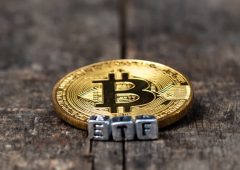Digital Currencies Will Transform Money Flow – Circle CEO
04.09.2024 8:00 1 min. read Alexander Stefanov
Jeremy Allaire, CEO of Circle, envisions digital currencies triggering a profound change in money velocity similar to the internet's impact on information and software.
In a recent interview with Empire, Allaire highlighted how the internet’s interconnected networks have enabled nearly costless data transfer, a concept he believes will apply to digital currencies.
Allaire referred to Solana (SOL) co-founder Anatoly Yakovenko’s vision, where blockchains are designed to operate at extremely high speeds, akin to light.
He explained that as the cost of storing and transferring value approaches zero, the speed and efficiency of money transactions could increase dramatically, much like the transformative effect of the internet.
He anticipates a dramatic rise in productivity as frictionless money transfers become commonplace. Allaire speculates that transaction volumes could surge by a factor of 1,000, vastly surpassing current figures.
This shift could significantly boost economic activity, aligning with Circle’s mission to enhance global economic prosperity through seamless value exchange.
According to Allaire, reducing the friction in financial transactions, whether in payments or more complex value exchanges like borrowing and lending, will lead to substantial economic growth and increased efficiency.
-
1
FTX Pushes to Dismiss Billion-Dollar Claim from 3AC
23.06.2025 15:00 1 min. read -
2
BIS Slams Stablecoins, Calls Them Ill-Suited for Modern Monetary Systems
26.06.2025 9:00 1 min. read -
3
ARK Invest Cashes In on Circle Rally as Stock Soars Past $60B Valuation
24.06.2025 19:00 1 min. read -
4
Trump’s ‘Big, Beautiful Bill’ Approved: What It Means for Crypto Markets
04.07.2025 7:00 3 min. read -
5
FTX Pushes Back Against $1.5B Claim From Defunct Hedge Fund 3AC
23.06.2025 11:00 1 min. read
Top 10 Biggest Crypto Developments This Week
The latest WuBlockchain Weekly report captures a high-volatility week in crypto. From Bitcoin’s new all-time high to controversy around Pump.fun’s presale and Elon Musk’s political Bitcoin endorsement, markets are witnessing sharp shifts in momentum and policy.
Federal Reserve Chair Jerome Powell Reportedly Weighing Resignation
U.S. financial circles are bracing for a potential shake-up as reports suggest Federal Reserve Chair Jerome Powell is considering stepping down.
Peter Schiff Warns of Dollar Collapse, Questions Bitcoin Scarcity Model
Gold advocate Peter Schiff issued a stark warning on monetary policy and sparked fresh debate about Bitcoin’s perceived scarcity. In a pair of high-profile posts on July 12, Schiff criticized the current Fed rate stance and challenged the logic behind Bitcoin’s 21 million supply cap.
Report Claims That Binance Played a Foundational Role in the Creation of Trump Related StableCoin
Changpeng Zhao, the former CEO of Binance, reportedly supported crypto projects linked to the Trump family while privately seeking a presidential pardon, according to a July 11 report by Bloomberg News.
-
1
FTX Pushes to Dismiss Billion-Dollar Claim from 3AC
23.06.2025 15:00 1 min. read -
2
BIS Slams Stablecoins, Calls Them Ill-Suited for Modern Monetary Systems
26.06.2025 9:00 1 min. read -
3
ARK Invest Cashes In on Circle Rally as Stock Soars Past $60B Valuation
24.06.2025 19:00 1 min. read -
4
Trump’s ‘Big, Beautiful Bill’ Approved: What It Means for Crypto Markets
04.07.2025 7:00 3 min. read -
5
FTX Pushes Back Against $1.5B Claim From Defunct Hedge Fund 3AC
23.06.2025 11:00 1 min. read


